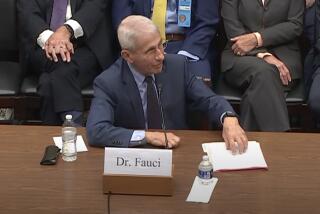The congressional GOP sharpens its knives to attack scientific research

Nothing is easier, if you’re a political philistine playing to an audience of anti-intellectual rubes, than to ridicule scientific research projects by caricature.
Rep. Lamar Smith, R-Texas, who frighteningly enough is chairman of the House Committee on Science, Space, and Technology, appears bent on polishing this methodology to a lustrous glow. As detailed in a thoroughly unnerving report by Science’s Jeff Mervis, Smith has his staffers compiling a spreadsheet of National Science Foundation grants vulnerable to being lampooned as, in Mervis’ words, “silly, obvious, or of low priority to society.”
Campaigns like Smith’s are applauded by conservative lawmakers and the Republican National Committee, which likes nothing more than to join an attack on eggheads--last month it purported to identify the “five most absurd spending items” from an earlier roster assembled by Sen. Tom Coburn, R-Okla. These always play well because they can be disguised as valiant defenses of taxpayer funds, and because the targets are typically university professors, those elitists.
But they raise the hackles of NSF officials and the Assn. of American Universities, which on Monday warned that the Smith committee’s “current inquiry...is having a destructive effect on NSF and on the merit review process that is designed to fund the best research and to remove those decisions from the political process.”
The AAU points to several dangers in Smith’s approach. First, his demands for the names and comments of expert reviewers of NSF grant applications punctures the confidentiality guaranteed those reviewers. That can’t help but discourage top experts from participating. This is a point that NSF officials have made consistently, into Smith’s deaf ears. We reported on this battle between Smith and the NSF last summer.
The AAU also discerns the political component of Smith’s campaign. It fears that “NSF will be pressured to fund only ‘safe’ research that does not attract political attention.” Scientists, the AAU says, shouldn’t be discouraged from pursuing unconventional research--”the kind that sometimes ends up winning Nobel Prizes and transforming science and society.”
Its statement notes that several projects on Lamar Smith’s hit list “are being investigated for no apparent reason other than the sound of their titles. Others are studies related to climate change or to the study of any countries other than the United States.” The committee spreadsheet can be found here.
A good example of how political sophistry can trump sound scientific effort comes from the conservative attack on a project at Indiana University examining how information spreads via Twitter. The mysteries of how memes spread are of interest to anyone in the information field. But the IU project seems to threaten conservatives so deeply that they’ve made a “deliberate attempt to distort what we’ve done,” as the project chief, Filippo Menczer, told Science’s Mervis.
They’ve portrayed it as a government effort to attack free speech, especially conservative speech. Among the sources of this misconception Mervis identifies are the Washington Free Beacon, a right-wing website, and Ajit Pai, a Republican member of the Federal Communications Commission.
Smith advanced the attack Monday with a letter to NSF Director France A. Cordova (a physicist and former chancellor of UC Riverside) demanding, among other things, “every e-mail, letter, memorandum, record, note, text message, all peer reviews considered for selection and recommendation” related to the project. If you want to stifle the spirit of independent scientific research, that’s the way to do it.
The question posed by all this is clear. Do you want your scientific research conducted and supervised by scientists, or by ideologues for whom the search for truth is the least desirable thing on Earth?
Keep up to date with the Economy Hub. Follow @hiltzikm on Twitter, see our Facebook page, or email mhiltzik@latimes.com.
More to Read
Inside the business of entertainment
The Wide Shot brings you news, analysis and insights on everything from streaming wars to production — and what it all means for the future.
You may occasionally receive promotional content from the Los Angeles Times.











